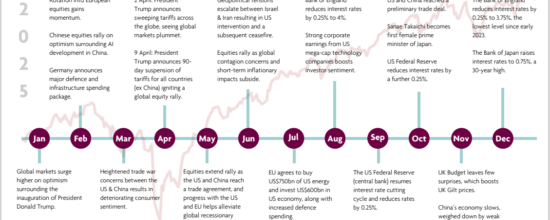Market Update: UK rates could rise further in face of stubborn inflation
To download the PDF click here.
In contrast to persistently high inflation rates in the UK, the pace of price rises slowed substantially in the US, which encouraged stock markets higher in May.
Bond markets were unsettled in May after higher-than-expected inflation figures raised fears the Bank of England would have to continue raising interest rates. Britain’s inflation rate is starting to ease, falling from 10.1% in March to 8.7% in April, but not by as much as economists were hoping. One reason is that food prices are still rising at their highest rate in nearly 45 years.
However, core inflation, which removes volatile energy and food costs, jumped from 6.2% in March to 6.8% in April. This measure is monitored closely by the Bank of England when deciding interest rates. With inflation proving stickier than expected, it now appears the Bank will need to raise interest rates at its next meeting.
On a brighter note, US stocks were lifted amid hopes American politicians are closing in on a deal to extend the US debt ceiling. The government borrows money for essential expenses like social security and Medicare, but reached its current limit of $31.4 trillion in January. However, the Republicans, who have a majority in the House of Representatives, were refusing to raise it unless President Biden and the Democrats agreed to spending cuts.
US inflation falls sharply
Stocks edged up after data showed US prices were rising slower than expected – evidence that the US Federal Reserve’s (Fed) interest rate hikes are bringing prices under control. The consumer price index rose at an annual rate of 4.9% in April, down from 5% in March and the tenth month in a row that price rises have slowed.
Despite the onging banking turmoil, the Fed raised interest rates for the tenth time in a row, by a quarter percentage point to between 5% and 5.25%, up from near zero in March 2022. The Fed signalled it is ready to pause rate hikes and said further hikes would depend on how the economy performs. Regulators also seized First Republic Bank and sold it to JPMorgan Chase, making it the third major bank fail this year. While conditions have stabilised in the banking sector, some risks remain.
Credit ratings agency Moody’s has warned the UK faces a mild recession this year, as the economy suffers from high prices and rising rates. UK GDP rose by 0.1% in the first quarter, but a 0.3% drop in March suggests the recovery is fragile. The Bank of England hiked interest rates by 0.25 percentage points in May, taking the base rate to 4.5%. This is the twelfth consecutive rise since December 2021 and the highest in almost 15 years.
European stocks retreated after data showed the German economy had slipped into recession. German GDP shrank unexpectedly in the first quarter by 0.3%, following a contraction of 0.5% at the end of last year. After last year’s energy price shock, inflation has taken a heavy toll on Germany’s economy, with consumers spending far less.
China’s economy enjoyed a robust start to the year as consumers unleashed their spending power following the easing of pandemic-related restrictions. In the first quarter, GDP expanded by 4.5% compared with the same period last year, marking the swiftest growth rate in 12 months.
Additionally, retail sales skyrocketed by 18.4% in April, surpassing the 10.6% increase in March. However, there are signs the post-pandemic recovery isn’t as strong as many expected.



